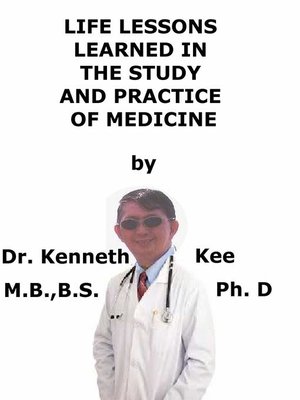
Sign up to save your library
With an OverDrive account, you can save your favorite libraries for at-a-glance information about availability. Find out more about OverDrive accounts.
Find this title in Libby, the library reading app by OverDrive.



Search for a digital library with this title
Title found at these libraries:
| Library Name | Distance |
|---|---|
| Loading... |
This book is about the 10 life lessons which I have learnt in the study and practice of medicine. This life lessons are applicable to all who wish to learn and practice good medicine.1. The importance of OBSERVATIONis learnt from my teachers and professors of medicine in the University of Singapore2. The importance of STUDYING WISELY and not by rote. You will learn how to extract the common factors in a textbook and fill in the blanks for different diseases and anatomical parts3. The importance of LISTENING and COMMUNICATIONListening skills important in getting a history from patients and also in social life. A listening ear is always needed by most people who has problems at home and at work.COMMUNICATION is important in getting all the information about the history of a patient and his recent complaints.4. TECHNIQUE OF EXAMINATIONA technique of physical examination that starts from the head down to the toes is the best way to do a comprehensive medical examination of a patient without missing out any signs. The examination includes seated, standing and lying positions.5. DIAGNOSIS - COMMON ILLNESS FIRSTIt is important in a diagnosis of a patient that the common illnesses should be eliminated first before going into exotic diseases which are rare but still possible.6. TREAT THE WHOLE PERSON NOT THE DISEASEIt is important to take a holistic approach to medical treatment of a patient. Always treat the whole person and not just a disease. The patient is a human being with feelings, fears and emotions which should be addressed before giving the treatment unless it is an emergency. Even then always treat the patient and remember to talk to him or her and the family.7. HEALTH EDUCATIONThis is one of my favorite subject and the basis of my doctorate dissertation on the importance of Health education on the understanding and prevention of an illness. It is important to know the disease and how to prevent it.8. COMPASSIONA doctor without compassion is like a scientist working on laboratory animals. All medical students must learn how to be compassionate to their patient and regard him or her as a fellow human being instead of a case or disease.9. COUNSELINGPart of the work in a family doctor's life is dealing with emotional problems of the patient and his or her family. The family doctor is able to help reconcile differences in a family or between couples.10. PITFALLSThere are many pitfalls in a medical practice whether in hospital or in a private clinic. It is imperative that doctor take precautions to avoid these pitfalls.Dr Joseph Bell who was the professor of medicine and the person whom Arthur Conan Doyle based his famous Sherlock Holmes character said: "In teaching the treatment of disease and accident, all careful teachers have first to show the student how to recognize accurately the case. The recognition depends in great measure on the accurate and rapid appreciation of small points in which the diseased differs from the healthy state. In fact, the student must be taught to observe. To interest him in this kind of work we teachers find it useful to show the student how much a trained use of the observation can discover in ordinary matters such as the previous history, nationality and occupation of a patient."







